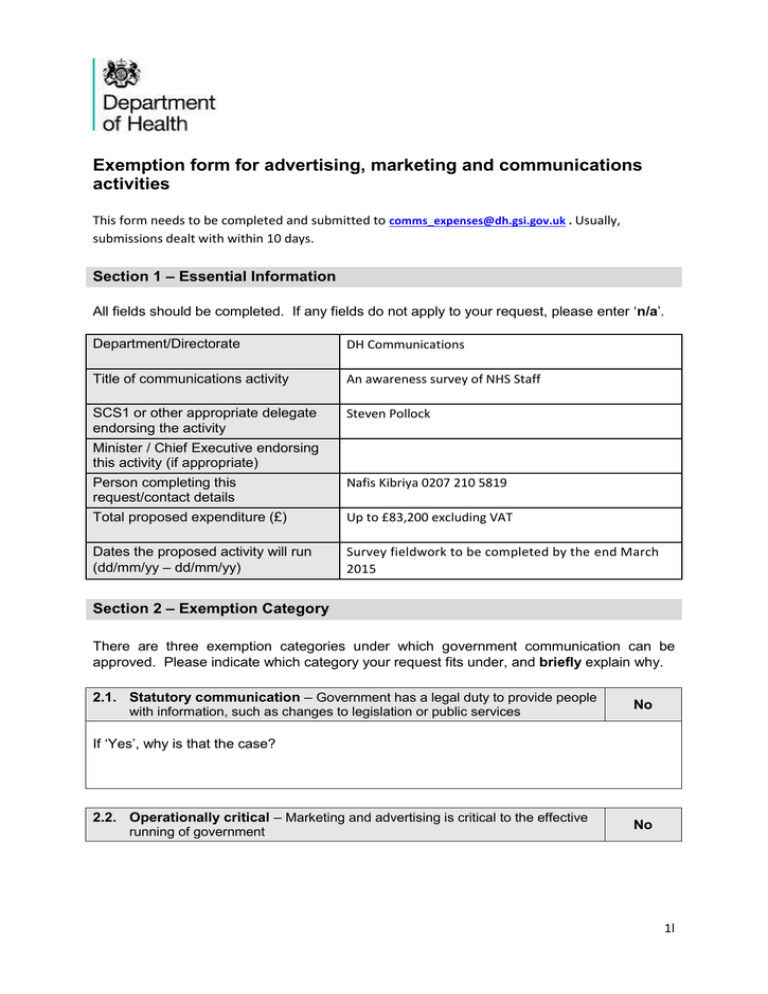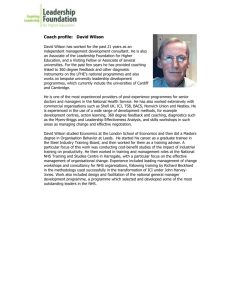NHS Staff Survey
advertisement

Exemption form for advertising, marketing and communications activities This form needs to be completed and submitted to comms_expenses@dh.gsi.gov.uk . Usually, submissions dealt with within 10 days. Section 1 – Essential Information All fields should be completed. If any fields do not apply to your request, please enter ‘n/a’. Department/Directorate DH Communications Title of communications activity An awareness survey of NHS Staff SCS1 or other appropriate delegate endorsing the activity Steven Pollock Minister / Chief Executive endorsing this activity (if appropriate) Person completing this request/contact details Nafis Kibriya 0207 210 5819 Total proposed expenditure (£) Up to £83,200 excluding VAT Dates the proposed activity will run (dd/mm/yy – dd/mm/yy) Survey fieldwork to be completed by the end March 2015 Section 2 – Exemption Category There are three exemption categories under which government communication can be approved. Please indicate which category your request fits under, and briefly explain why. 2.1. Statutory communication – Government has a legal duty to provide people with information, such as changes to legislation or public services No If ‘Yes’, why is that the case? 2.2. Operationally critical – Marketing and advertising is critical to the effective running of government No 1l DH - Advertising, Marketing and Communications Request Form If ‘Yes’, why do you think this is the case? 2.3. Evidence of effectiveness – There is robust evidence that marketing and advertising deliver measurable outcomes that meet government objectives Yes If ‘Yes’, briefly explain how this activity delivers outcomes that meet government objectives. This is a quantitative survey of a nationally representative sample of NHS staff which will show their awareness and understanding of a number of policy communications programmes such as Genomics, Compassionate Care, the Better Care Fund, Technology, Public Health and Mental Health. The results of this survey will shape how these programmes communicate with their key audiences within the NHS for example by demonstrating the effectiveness of certain messaging and channels. This may also inform future programmes who would also want to target these specific audiences. Evaluation is a top priority for Government Communications Service given the vital role it plays in ensuring continuous improvement as well as demonstrating the benefit of communications to senior leadership. Section 3 – Rationale 3.1. About the proposed activity Please explain briefly the proposed activity and outline – where appropriate – if that activity is part of a bigger communications or marketing campaign and if so why this request is submitted separately. What are you proposing to do and how you want to do it, including details of: the target audience(s) messages / proposition the channels you plan to use for that activity; and detail any plans to pilot innovative approaches. Why you have chosen the particular type or types of activity/ies (eg channels) to achieve your objectives, providing details of audience insight, analysis or evaluation results used. This survey will be conducted by a research partner of a nationally representative sample of a number of key NHS staff including commissioners, GPs, practice Nurses, practice staff/managers, Chief Executives, hospital doctors, hospital nurses, NHS finance and clinical managers, allied health professionals, health visitors, mental health nurses, Health and Well Being members and CCG staff. Below is a table with the size of each sample in previous NHS staff surveys which will form the basis of the sample size for this survey: Occupation Spring 08 Autumn 08 No. Interviews Summer Spring Winter 09 10 10 Winter 11 Winter 12 2 DH - Advertising, Marketing and Communications Request Form GPs Practice Nurses Hospital Doctors Nurses in Secondary Care NHS Managers Practice Managers Clinical Leaders CCGs Community Workforce Midwives booster Health Visitor Booster Total 185 104 206 105 204 104 206 107 202 102 200 103 200 102 200 100 200 100 150 100 200 101 150 103 201 101 153 99 200 n/a 207 n/a 203 n/a 212 n/a 201 50 202 51 200 51 n/a n/a n/a n/a n/a n/a n/a n/a n/a n/a n/a n/a 50 n/a 100 50 n/a 100 50 50 101 n/a n/a n/a n/a n/a 51 50 n/a n/a n/a n/a n/a 75 85 908 934 1,113 1,124 1,001 1,130 1,141 . We intend to run one wave of the survey before the end of March 2015 in order to establish a baseline of NHS staff awareness and understanding of a number of policy communications programmes such as Genomics, Compassionate Care, the Better Care Fund, Technology, Public Health and Mental Health. Question areas have already been identified with the Account Managers and Account Directors for each policy communications programme. The two overarching themes are organisational change and how/why individuals within the NHS work differently as a result of the changes made. The questions will look into awareness, confidence and recall of policy communications messaging as well as if individuals know what actions they should be taking as a result of the changes made by the programmes above. The survey will be up to 40 questions and conducted via telephone. This method has been deemed the most appropriate and effective as not all NHS staff regularly use their email and ensures that the participants may ask further questions to the interviewer to clarify any issues they may have regarding the survey. Previous surveys have also been conducted via telephone. Similar questions to NHS staff about their awareness and understanding of DH policy used to be included in the annual NHS Staff Survey. However, this survey was last conducted in 2012 and since then this information is not been captured. This Should the Department not be able to conduct survey, we will not be able to ensure that communications to NHS staff are effective. This would impact both the Government’s reputation, value for money of the communications work conducted and the ability of NHS staff to do their job. This will also provide a retrospective indicator of how well these programmes performed. Lessons will be learnt from the results of the survey which will impact on how DH communicates with NHS staff in the future with different programmes but similar audiences. 3.2. Communication objectives What do you aim to achieve with the activity proposed? What are your communication objectives? Specifically, explain the change in behaviour you may seek to achieve. Explain how these relate to your department’s strategic communications objective where appropriate. (100 words approx) 3 DH - Advertising, Marketing and Communications Request Form This will enable us to explore and benchmark the attitudes of NHS staff on several key policy communications programmes including Compassionate Care, Public Health, the Better Care Fund, Technology, Mental Health and Genomics. The evidence collated will be used in the quarterly evaluation reports for the Communications Performance Centre to ensure that these programmes have achieved their communications objectives. Communication plans and objectives will be adapted to reflect in line with what the results of the survey suggest. 3.3. Expenditure Provide a detailed breakdown of the proposed expenditure by activity. Separate any procurement (agency fees / production) or evaluation costs. The overall cost will be £83,200. This is in line with the previous surveys conducted. The activity paid for through this budget will be; Questionnaire development Sample recruitment Fieldwork Reporting on findings As the tendering process is yet to begin, there are no specific figures for each area of expenditure. 3.4. Value for Money Explain how your proposed activity represents good value for money. Highlight how any of the following have been used to maximise value for money. (150 words approx) No and low cost channels Partnerships / sponsorship Negotiated discounts Collaboration with other government departments Re-use of existing materials Benchmarking of costs Year-on-year savings Return on marketing investment There is no existing capability to conduct large scale staff polling in-house through our digital channels. A two stage full tendering process will appoint a contract to the most successful agency in terms of both value for money and technical skill. The results of the survey will be internally published and shared with relevant policy teams via the Account Managers and Account Directors. An alternative of this survey would be a focus group however the sample would be very small compared to the survey and therefore the information provided in this scale would be negate the smaller cost. 3.5. Limitations of Approach What are the known limitations or weaknesses of your proposed approach/ what are the risks of it not being approved? (100 words approx) 4 DH - Advertising, Marketing and Communications Request Form As with any evaluation of media by government, there is the potential for this to be perceived as spending money to find out how effective government “spin” is. We would rebut this strongly. There are risks involved due to the timing of the survey; however this survey will be used for a retrospective check on how well the policy communications programmes performed in terms of their audiences of NHS staff. This will assist different and future policy communications programmes in how to engage with specific NHS staff such as tone and phrasing of key messages, channels used to communicate and how organisational change is being perceived. 3.6. Evaluation It is important to demonstrate the effectiveness of marketing and comms activities undertaken. Evaluation provides you also with valuable insights that will help you to improve and better target activities. Please briefly outline how you will evaluate your communication activity: How will you use the findings? When will you begin and finalise the evaluation? The results of the survey will be used to ensure that policy communications programmes objectives are being met and to understand NHS staff understanding and attitudes to these programmes. They will be further used in the Compassionate Care, Public Health, the Better Care Fund, Technology, Mental Health and Genomics Quarterly Evaluation Reports (QER). The QERs are an integral part of the Communications Performance Centre (CPC). The CPC is the quarterly evaluation for all communications activity. All policy and corporate programmes are evaluated against the objectives set out for the quarter and recommendations are made as to how to improve the effectiveness of the programme. 5




